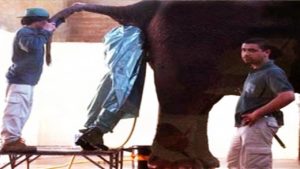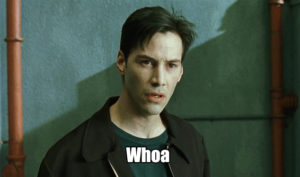Do you ever wonder how a voice artist lands his or her big break? What’s the secret to standing out amidst a crowded field of eager-to-please actors, all of whom probably have more experience, more training, and more passion than you?
I’m here to give you a few tips on what it takes to land that big breakthrough voice acting gig you’ve been striving for. After reading this, there’s no reason to believe you can’t become the next Marcus Bentley. And if you don’t know who that is, I’m afraid you’re not quite as devoted to the sacred art of voice acting work. (This is a joke.)
A BRIEF HISTORY
Voice actors have existed since the invention of radio. Maybe even before that. I picture a group of cavemen sitting around a fire watching one of their own silently act out a recent hunt, while another caveman narrates the story. Perhaps they even use animals for sound FX?

The history of the voice actor does date back quite a few years — before the Titanic sunk, in point of fact. Before the invention of the vacuum cleaner, tea bags, radar, the electric washing machine, water coolers, paper cups, hair dryers, kiss-proof lipstick, and movies with sound. We had voice actors before we had submachine guns.
According to VoiceOverActor.com:
It is commonly believed that the first voiceover was from Walt Disney, as Mickey Mouse in “Steamboat Willie.” And although this was a long time ago, in 1928, in actual fact the first voice over was in 1900! This historical achievement belongs to Reginald Fessenden, a Canadian inventor. He was thrilled with Alexander Graham Bell’s new device, the telephone, and set out to create a way to remotely communicate without wires. The beginning of “Wireless!” In 1900, working for the United States Weather Bureau, Fessenden recorded the very first voice over: a test he made reporting the weather.
He was also the first voice of radio. In Boston, in 1906, during the Christmas season, he recorded an entire program of music, Bible texts, and Christmas messages to ships out at sea.
From these early artists stemmed a number of talented voice actors, including Mel Blanc, Walt Disney, and Don LaFontaine. Now, seriously, if you don’t know the LaFontaine, you seriously have zero passion for this line of work, as he is to movie trailers what Tom Brady is to football — the GOAT:
These guys had it easy, as they were the pioneers in what would become a rather lucrative profession that millions of people are now trying to break into. Who doesn’t want to earn a nice chunk of change by sitting in a booth for a couple hours a day? It’s every stay-at-home parent’s ultimate dream! (Well, that and a robot that takes care of house vermin — i.e., children and pets.)
THE DONT’S
So, how do you land this gig? Most people have no idea how to present themselves to a company. At Ydraw, we get several emails a week from various voice actors, but rarely choose any of them simply because they don’t do anything to stand out from the rest of the pack.
Or they show up in sandals. Never show up in sandals.
Look, simply calling a business and saying, “Hey, I’m a voice artist,” won’t land you any gigs. Neither will sending an email outlining your work history — unless you’ve worked with Paul McCartney. Then all bets are off.
In this day and age, anyone and everyone can do practically anything if they have the right equipment. Heck, machines can make even the most incompetent singers sound semi professional … as anyone who saw the recent Beauty and the Beast will attest.
So, how do you make your voice work stand out? It’s really simple. Just follow these complicated steps:
DO A SAMPLE FOR FREE
You read that right. For a business to gauge whether or not your talents meet their requirements, they need to see, nay, hear you in action. Again, it does a business manager or recruiter no good to read resumes, or listen to blab about your ingenuity over the phone.
Take Ydraw for example. The videos we produce require unique talent. And while past videos/portfolios may demonstrate your ability to perform at a high level, we can’t know for sure if you’d make a good fit with our company until we get a chance to hear your voice set over our beautiful designs.
Providing a free audition is the best way to turn any business manager’s head, mainly because they’re cheap and love the word “free”, but also because it shows you are 100% willing to do whatever it takes to land a gig. Well, almost anything.

Here’s an idea. When applying for a particular gig, research the various voice actors employed by the company in question. Then, figure out a way to separate yourself from the pack. Do something that makes that company realize what their current crop of talent is lacking. For example, you could take one of their fully produced videos, copy the script, and provide your own voice over. You could rework the script, thus demonstrating even more creative talent, or add something completely new to the production that blows the company away.
Bam! Now, you’re not only showing off your skill, but also your value.
If it were Ydraw, and you sent us something amazing, we’d figure out a way to utilize your talents whether we were hiring or not. If you rock, we want you to rock for us. Get it?
Even if you don’t land the gig, just getting your stuff out there is important. Who knows? Maybe we’ll look you up down the road, or connect you with a client in need of radical services.
You heard that right. Radical.
Just because you’re not a fit at the present time doesn’t mean you won’t be added to the rotary phone speed dial.
DO SOMETHING CREATIVE
Another avenue to explore is to do something worthy of a Keanu, “Whoa!”

Examples include:
– Send a tape with you performing different voices
– Read from a crazy book
– Write a hilarious script, then read it back to us
– Sing something amazing (just not Adele)
– Perform a script reading with your cat
– Read something while setting yourself on fire (disclaimer: this is a joke. Please don’t do this.)
– Read Biblical versus with a Scottish accent
Ok, most of those are terrible ideas, but you get the gist. Do something that will make us remember you. Don’t be afraid to embarrass yourself. Hollywood is full of strange audition tales. Heck, Sean Young showed up at Warner Bros. dressed as Catwoman hoping to land the gig that ultimately went to Michelle Pfeiffer in Batman Returns. Me-ouch?

At least she tried, right?
Auditioning is a process of trial and error. You’ll likely fail more times than you succeed, as the old adage goes, but all you need is one success for your career to take off to crazy new heights.
Just stay away from bland e-mails that follow this boring template: “Hi, I’m Bob. I’m a good voice over artist. I would like to work for your company. I’ve done a lot of voice over work. See attached. I’ll do a script for you for a small fee to show off my talents. I own a home studio with an ISDN patch. Blah, blah, blah …”
Seriously? Don’t let that be your pitch. Also, don’t fill the subject line with: “Do you use voice actors?” No. 1, it’s not very catchy, and will instantly be ignored. No. 2, what? No. 3, it shows you haven’t done the proper research. That’s like walking into Best Buy asking if they sell electronics — which happened, a lot. At least when I worked there.
Try something like this in the subject line: “Your next great voice actor has arrived!” Then, produce an e-mail that caters to the company’s needs:
This is Bob,
I’m perhaps the greatest voice actor in town, and I’d love to work for your company. I could bore you with a recap of my work history, but you’re most likely busy and eager to move onto the next e-mail. So, I’ve attached a very special audio file. It’s me performing one of your videos. Except, I’m using a cockney accent, because, after reviewing your collection of awesome videos, I realized you don’t have anyone who can speak in a cockney accent. Give it a listen, then give me a call.
Bob
If you sent me that e-mail, I’d read it and probably get a kick out of it. And even if I didn’t end up hiring you, I’d certainly remember your audition for future reference.
TRAIN, TRAIN, TRAIN
You can never be too good at anything, so why not continue to improve? An article I found on Backstage.com delves into this aspect of the business:
Like learning to swim, you have to get into the water. You can’t figure it out by walking around the edge of the pool. One of the key things to learn is the different script genres within the commercial genre, i.e., real person, announcer, spokesperson, character, banter, PSA, etc. There are other genres and they all require different interpretive skills and talents. Promos, audiobooks, character animation, and ADR are the most popular. There’s also comedy and drama to be considered, and some folks may have a knack for one or the other. In addition to knowing the genres, training includes timing, relaxation, projecting a naturalistic tone, microphone technique, releasing inhibitions, and learning to create the world of a script within a lonely, lifeless recording booth. Unlike acting for film, TV or stage, you don’t typically have other actors or props with which to interact. You do it all with your imagination!
Don’t settle for second, third, or fourth best. You must understand that, no matter how much practice you’re putting into a skill, someone, somewhere is putting in twice as much. And they probably aren’t dating anyone, which means they have a lot of time on their hands.
Make yourself stand out by being so inundated with talent that you’ll literally leave our jaws on the floor with just one audition. Make a company need to have you.
Our No. 1 go-to voice actor, Dawson McKay, worked in every aspect of show business before breaking in as a voice actor. In his own words:
Growing up, I fell in love with the most colorful of entertainers: The Muppets, David Copperfield, and KISS all created fantasy worlds to which we could escape, and I studied their every move.
Over the years, I searched for my ideal creative outlet, working professionally in magic, puppetry, radio, cartooning, sound design, video editing, and acting. I finally found my home in voice over, which allows an actor to play everything from rock star to puppet to your friendly guy-next-door. Performing in front of a live audience is always a rush, but I do love when the curtain goes up and the lights go on in my studio and it’s time to perform … your copy.
Dawson studied acting, worked tirelessly on inflections, pronunciations, etc. And he didn’t stop until he landed his big break. Now, he not only works for us, but a number of high profile companies, as seen on his website, http://www.dawsonvo.com/.
LET’S RECAP
— When you call, offer to do a sample for free
— Send something creative, be it a crazy recording session, or you doing an impersonation of Charlton Heston from the Ten Commandments … make yourself stand out
— Train as if your life depended on it, because, in truth, it kind of does
Voice acting is one of the more enjoyable, rewarding, and lucrative careers a person could strive for. One great gig could land you roles in cartoons, commercials, or even movies. It’s a life changing career.
So, what are you waiting for? Stop reading this right now, and go out there and put these suggestions to good use. Then come back and pay me a manager fee. I’m not kidding. I want 30% of whatever you make.